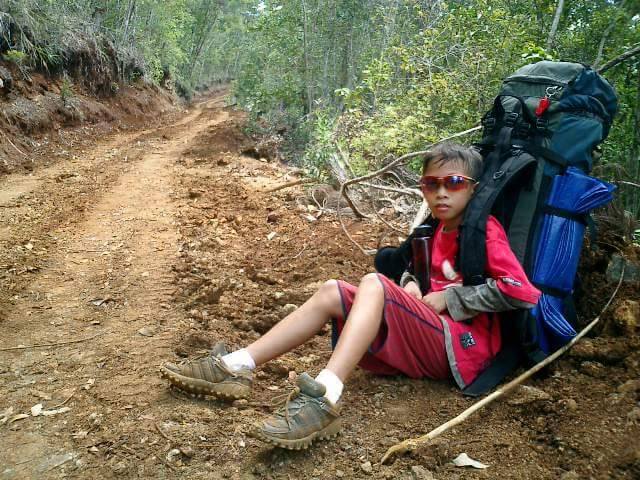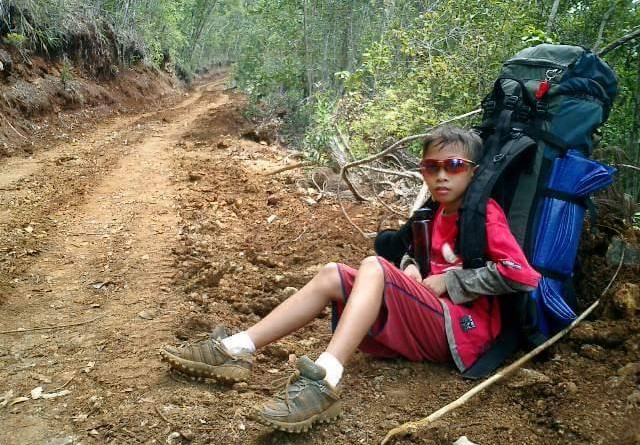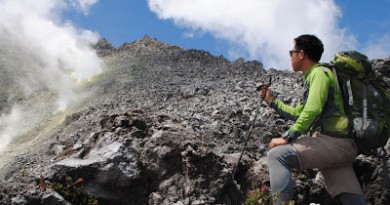Letter to a young mountaineer, X: What beginners can teach us

You were a beginner once, but now beginners are looking up to you for advice and inspiration. They ask you all kinds of questions and sometimes you complain to me about the way they have come to depend on you for information about the mountains they want to climb.
“Why are they asking me all these simple questions? They can easily get all these facts from the Internet!” you would say, adding: “I’ve written so much about these things – all they have to do is search for them!”
But let me ask you: Don’t you think there’s a difference between reading something from the Internet, and hearing the same thing from someone you look up to? When you answer these questions, no matter how simple, bear in mind that you not only inform, but inspire. To paraphrase Robert Frost, your role is not so much to teach, but to awaken. Thus, whenever you engage with novices, strive to awaken their passion for the outdoors; their love for learning more about it; and their sense of responsibility – to others, to the environment, and to their own selves.
And now that you are no longer a beginner, I want you to develop the art of mentoring the next generation. Not just because you need to pay forward whatever you’ve learned from people like me; not just because there’s so much at stake with the environment and thus we need people to care about it deeply – but because you still have much to learn about the outdoors. We all do. And many of these lessons can actually come from the beginners themselves.
First of all, beginners can teach us how to be patient with other people. Surely, when you were a kid, there was a time when you kept on asking your parents questions. Did they ever complain? I have memories of asking about transformers on electric posts, and where longicorns can be found, but I don’t remember ever being turned away, or told to shut up. It is only now that I’m beginning to realize how much patience it takes to be a parent – or be in a position of nurturing someone. When a newbie asks you questions about the mountains, exercise the same patience as a parent would towards their child.
This is not an easy thing to do. It can be very frustrating at times. Some people ask me how to get from their hometown in Bulacan to a mountain in Cavite, and I am always tempted to say: “How should I know? I don’t live in Bulacan!” To my mind, the only legitimate grounds to disregard these questions is to nudge them towards learning how to research themselves. To paraphrase the famous adage: “Give a man information and you guide him for a day. Teach a man how to research and you guide him for a lifetime.” Indeed, there are times when you cannot spoon-feed them with information that they can easily gather.
But what if a beginner is genuinely interested to know about something? What if he presents you a scenario and asks you how you would respond to it? For instance, I receive a lot of reports of people catching others in the act of leaving garbage on a campsite – or vandalizing some rocks. “Who can we complain them to?” they ask. I would also get letters from people living in various areas with lots of mountains – none of which have been documented. “How do we climb those mountains? How do we form a club?” You must not fail to see the genuine desire for them to learn; their genuine concern for the mountains – and give them a proper response.
And so, in these instances, the question becomes: How do you actually answer in a way that will satisfy, educate, and enlighten? This brings me to the second lesson you can learn from beginners: How to articulate the things you already know in a way that is easy for everyone to understand. In other words, they can teach you how to teach.
Experience will tell you what I am talking about, but just to give you an example, I have learned with my dealings with beginners that when you instruct them, you have to be very detailed. Don’t just tell them “bring gloves” – they might end up bringing garden gloves. Don’t just tell them to bring a tent – they might end up bringing a beach tent. Don’t just tell them to bring water – tell them how much water they should bring. For beginners, details matter.
Teaching also involves giving them space to grow, and at times, even make mistakes. In the mountain, there will be times when each hiker has to make decisions for himself, and you have prepare them for that – and these applies to ladies too, as I have told you in a previous letter. Painful though it might be, a parent will have to let a child ride a jeepney, then a bus, and then a plane on his own, and so must you allow the people under your aegis to develop wings of their own, and not only climb mountains – but to lead others in the future.
Also, when a hiker makes a mistake, sometimes you have to let the mountain be his teacher, even at your expense.
I experienced this once when a young hiker I was guiding committed a grave error that nearly cost me my own life – as we were on a precarious portion of a trail. I was so mad at him because I gave him clear instructions on what to do, but he still did not do it. What made it more painful for me was I took responsibility for him during that hike. For a long time, could not bring myself to forgive him. But later on, I realized that I could have been more patient, and that the experience itself would have taught him more than my anger ever could.
Beginners can also teach you a thing or two about humility and pride. The beginner will obviously be proud about his hiking accomplishments. He will boast about the things that you would consider to be too minor – and this may cause you to be annoyed. Don’t ever compete with them! Indeed, never harbor any competitive feelings towards the people you are mentoring. Let them be proud of the ten mountains they have climbed, even when you have climbed many more. Let them be proud of the altitude they have gained, even when you have reached far more than that. Like a father who allows himself to be beaten in chess by his five-year old son, let them think highly of themselves if that’s what will encourage them to keep going. Someday, they will learn to appreciate what you’ve done, when they begin to see your footsteps in the places they have struggled to reach. The mountain itself will teach them humility.
Still, while warning you not to feel competitive with beginners, you can tap on their spirit of adventure to take your own leaps of faith, and go beyond what you’ve already done. Like I said, you still have much to learn, and the world has infinite challenges. Let their high regard for you be part of your drive and inner strength, and climb the mountains you’ve always been dreaming of! To be inspiring, you must be inspired. Don’t be afraid to fail, because even in failure you can teach grace to those who are watching you. In fact, the only thing that is as valuable as teaching others how to succeed is teaching how to deal with failure.
Bear in mind, however, that there may truly come a point that a beginner will someday surpass your achievements. They may end up reaching higher peaks, or having more followers. Accept that moment with humility, but at the same time, with pride and joy in having been part of someone’s journey. Some of them will acknowledge your help, but many will simply forget. You must learn to move on, and not be discouraged. Never begrudge their feats – nor define them by their humble origins – or their weaknesses that you know too well. Never be jealous of the younger generation, because their success is also yours. I dream of seeing our flag in distant peaks and distant places, not knowing who will be the one to take it there. Yet I keep that dream alive, and you should keep yours too – even if their fulfilment lies in others’ hands.
Finally, beginners can remind you of the sense of wonder that first inspired you to discover the outdoors, and motivated you to keep climbing. As insatiable creatures of desire, we are wont to go higher, and aspire for more. This is both a blessing and a curse. It is a blessing because it can drive us to keep going. But it can also be a curse because it can take away the joy of being in places you used to only dream of. When I first climbed Mt. Apo, it was the fulfilment of a childhood dream, but the last time I climbed it, it had just become one of three mountains I climbed in Mindanao on that trip – and a dayhike at that. Reaching the summit that day still made me happy, but it was no longer the profound and very memorable moment when I was 19 and standing on top of the country’s highest peak, when everything seemed special.
Hiking with beginners can bring back that joy and novelty. Because when you see their faces light up with the littlest of surprises – be it a passing snake, a creeping leech or a fleeting rainbow – you cannot help but be reminded of your own journey’s beginnings. You cannot help but be reminded that you cannot climb the same mountain twice, because there’s something new and different each time – and that includes the people you are climbing with. If nothing else, they themselves – the young ones – should be the joy and the novelty that should give you reason to keep going back to the mountains you’ve already climbed.
And so when you bring someone on a hiking trip and she reaches a summit for the very first time, don’t mock her for being too excited, and being too mesmerized by the view.
She’s probably enjoying it more than you do.
Singapore
June 25, 2016
Photo at Mt. Hamiguitan courtesy of Peter Joshua Caiña who says his father brought him to this mountain at the age of 10.
LETTERS TO A YOUNG MOUNTAINEER
Personal essays by Gideon Lasco
I: A letter to a young mountaineer
II: Why do accidents happen?
III: Of doing and loving
IV: A difficult situation
V: Wise words from an old man
VI: The Philippines that I love
VII: The calling
VIII: The girl who climbs mountains
IX: A mountaineer’s legacy
X: What beginners can teach us
XI: The friends inside your backpack
XII: Unfollowing one’s self in social media





Leave a Reply
Be the First to Comment!